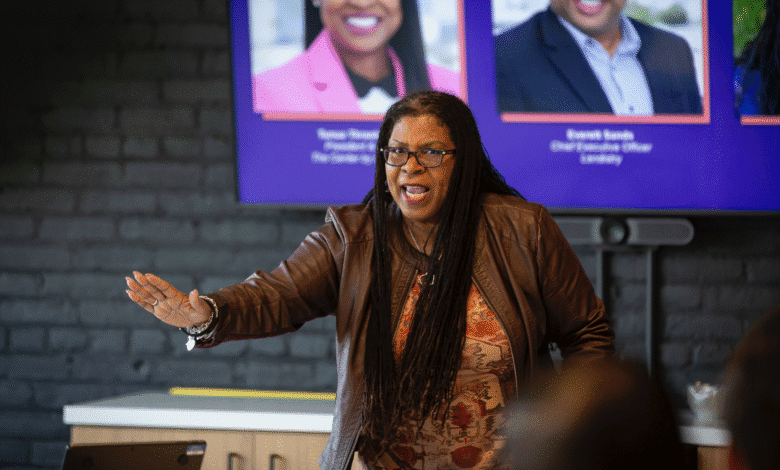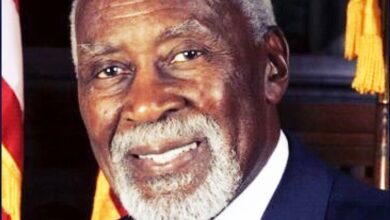
Tara Lynn Gray on How California Supports Small Businesses With Funding and Training to SCALE
By Charlene Muhammad | California Black Media
Small businesses in California – from sole proprietorships to small and medium enterprises (SMEs) – account for about 99% of all businesses in the state, making them the sector most responsible for job creation, more than 7 million.
![Cbm interview drtaralynngray sac cm june2025 th jwb th[30][45]](https://southbayblackjournal.com/wp-content/uploads/2025/06/CBM_Interview_DrTaraLynnGray_Sac_CM_June2025_TH_JWB_TH3045-683x1024.png)
Dr. Tara Lynn Gray
Considering their importance to the state economy, Gov. Jerry Brown created the Office of the Small Business Advocate (CalOSBA) in 2012 and paired it with the Governor’s Office of Business and Economic Development.
In 2021, Dr. Tara Lynn Gray was sworn in as the 5th Director of CalOSBA.
In that role, Dr. Gray serves as a voice and visionary for California’s 4 million-plus small businesses, providing information about state resources, connecting owners with funding, and communicating the priorities of small businesses to decision-makers in Sacramento.
On May 19, Gray spoke with a group of Black news publishers in Sacramento at a roundtable organized by California Black Media (CBM) as part of a legislative advocacy day sponsored by statewide organizations.
In the invitation-only information session, Gray spoke with the journalists and media outlet leaders, and small business owners, about her work with CalOSBA and shared insights she has gleaned over her three-decade career as a small-business-owner-turned-advocate.
Which small business owners do you primarily serve?
All of them. I am responsible for state programs that support all small businesses. During my four-year tenure to date, my team and I have administered 14 programs, a total of $5.3 billion in appropriations, supporting more 500,000 of the state’s 4.2 million small businesses. Guided by the Governor’s vision of building a California economy that works for all, our programs aim to deliver on that promise.
Describe the current state of small businesses in California.
The current state of small business is good. We are California. We are now the fourth-largest economy in the world. We invented the unicorn. Our businesses receive two-thirds of the venture capital in the United States. We file more patents than any other state. We have the lowest first-year failure rate of all of the states in the Union. General conditions for small business success in California are good and we have to protect this so the horizon remains good. There are pockets in communities and regions across the state that are still struggling with building strong entrepreneurial ecosystems that reflect the greater success that coastal regions and Silicon Valley have experienced. We are fortunate to have a governor and legislature that value small businesses and have worked together to provide resources for their growth and development.
Are there still systemic barriers affecting underserved entrepreneurs?
Absolutely. In my office, we center our work around what I call three imperatives for small business success.
The first is democratizing access to capital. That’s making sure that there is available capital — the right size and the right type of capital for every kind of small business. Capital not just for the start-up tech founder, but for the restaurant that wants to expand, for the nail salon that wants to add additional services, for the doctor who wants to add additional clinicians.
The second imperative is to diversify the innovation economy — making sure that all founders have access to the social and financial networks, and the thought leadership, that really help create synergy and market advantage.
Lastly, we must drive economic mobility through entrepreneurship, which is really about making sure that the zip code you’re born in, if disadvantaged, does not dictate how far you can go economically or how quickly you can build wealth.
Describe some programs CalOSBA has to support for aspiring small business owners or those struggling to stay afloat?
We tell small business owners not to go at it alone. There is help. The Governor made the funding for the Small Business Technical Assistance Program permanent at $26 million a year. We have $23 million dedicated to the Technical Assistance Program for the provision of one-on-one counseling sessions, training classes, and outreach. We rebranded the program from TAP to SCALE, which stands for Success, Capital, Access and Leadership for Entrepreneurs. The name is in line with the goals of the program, which is to help scale their businesses, by adding jobs, and to generating opportunity in their local economies
On a personal note, what motivates you to keep advocating for small businesses?
I’m driven to make a difference for all entrepreneurs and small business owners. They put everything they have on the line, in pursuit of the California dream, and the American dream.
I was raised by two blessed people. They were educators. They motivate me. My mom was a Spanish and French teacher at the beginning of her career before going back to law school, and becoming an advocate for people who were less fortunate. She was active politically, managing local campaigns and being a delegate to state and national democratic conventions.
And my dad is no slouch with a pair of master’s degrees. He retired as a high school principal after 31 years of service in the same school district. My mom retired as an assistant superintendent of a school district after years of labor negotiations work. I was raised with the belief that I could be anything and accomplish anything I set my mind to do. They taught us to be responsible, to participate in the political process, to exercise our right to vote, and to lift our voices in local government. Those are things that I learned in my childhood.
I combine that with my very close relationship to my maternal grandmother, who was an entrepreneur. I watched her influence in the community. I watched her support people. I watched her leadership in her circle lending to those in need.
I saw firsthand the power of entrepreneurship. It is naturally who I am, and I’m blessed to have been appointed by a Governor who saw it fit to utilize these gifts.
What’s one misconception that people often have about small business success or failure?
That’s a great question. I have two primary thoughts about that.
The first is that failure is not the end. Failure is often the pathway to success. I taught my students in past entrepreneurship classes to embrace failure. When you learn from your failures, you take those lessons on to the next thing. So, “Fail fast! Fail often! Fail forward!”
Second, entrepreneurs are often treated with a little bit more respect than small business owners. We think about small business owners as our restaurateur, as our nail salon owner, as our hairdresser, as our dry cleaner. We think about entrepreneurs as hardware and software tech founders who attract venture capital and have a different level of access to resources than our local food vendor.
We must recognize that all small businesses are putting everything on the line, every single day to support their families and realize their dreams – period.




